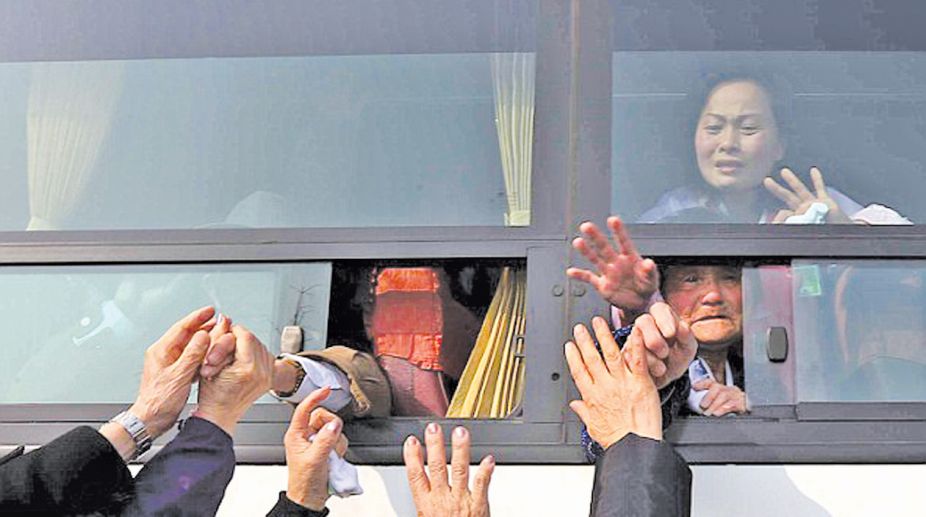Chain migrations which Donald Trump opposes
I learned about the concept of chain migration from others on student visas like me soon after I arrived in the USA. Student visas had several limitations.

Until a few months ago, Donald Trump and Kim Jong-un appeared to be deriving considerable pleasure from exchanging taunts and playground insults. Threats of fire and brimstone were hurled in both directions. The risk of hostilities loomed large.
That risk has by no means disappeared, but it has certainly receded. ‘Dotard’ and ‘Little Rocket Man’ are expected to come face to face at a summit late next month or in early June. There is the possibility of a historic breakthrough, but also the danger of a decisive breakdown that could lead to catastrophic consequences.
Apart from their distinctively eccentric hairstyles, one thing Kim and Trump clearly have in common is their unpredictability. The North Korean leader changed his tune around the turn of the year and, beginning with the winter Olympics in PyeongChang, South Korea, launched an impressive charm offensive.
It was facilitated by the fact that in the middle of last year power in Seoul had passed into the hands of the conciliatory Moon Jae-in. (His immediate predecessor, Park Geun-hye — South Korea’s first female president, and the daughter of a long-time military dictator — was earlier this month sentenced to 24 years in prison on corruption charges.)
Advertisement
Once a prominent human rights lawyer, Moon, like previous presidents Kim Dae-jung and Roh Myoo-hyun (whom he served as a close aide), has long been a votary of the so-called sunshine policy, aimed at melting hearts and minds in Pyongyang instead of freezing out the North. His overtures and open-mindedness have paid off. It’s worth keeping in mind, though, that in the past similar initiatives proved inconclusive and ultimately futile.
But there is a Trump card this time around — even though it could also be seen as the joker in the pack. To be fair, during the 2016 presidential campaign in the United States, the Republican campaign did raise the prospect of befriending the North Korean leader. As a rather impressionable president, Trump initially opted for pure belligerence. However, there have been indications all along of a grudging admiration for Kim.
The chubby heir established himself at the helm at a tender age, outmanoeuvred potential rivals, and has demonstrated an ability to peremptorily dispense with aides or even relatives suspected of disloyalty. It’s not hard to see why Trump might envy that level of power.
Last month, a pair of senior South Korean officials visiting Pyongyang found themselves being elaborately wined and dined by Kim, who apparently demonstrated an insightful grasp of international affairs as well as a sense of humour, even laughing at the way he is depicted in Western media. They returned to Seoul not just with a broadly positive impression but with an invitation for Trump, which Moon thought ought to be directly conveyed to the White House as soon as possible.
Somewhat to the surprise of the South Koreans, Trump not only immediately accepted without consulting any advisers, but got an official from Seoul to stand in the White House garden and share the news with the world.
Since then, US secretary of state-designate Mike Pompeo, in his capacity as CIA director, has visited Pyongyang for talks with Kim, who subsequently declared a moratorium on nuclear and long-range missile tests, and seemed to accept both the US military presence in South Korea and joint military exercises by the two nations. There has been talk of denuclearising the peninsula, and of a peace treaty that would formally conclude the 1950-53 Korean War.
North Korea has long aspired to be recognised by the US as a fellow sovereign state, worthy of direct negotiations. Trump is ever keen on going where no president has gone before. It does not necessarily follow, though, that the stars are aligned for a successful summit.
The US would like to think that North Korea has been driven to the negotiating table as a result of sharply strengthened economic sanctions, with China chipping in more seriously than in the past. Kim is suspected of believing that it’s his nation’s demonstrated nuclear capabilities that have compelled the US to play ball.
Most Western analysts are of the opinion that the concept of ‘denuclearisation’ means very different things to the two sides, and that North Korea has no intention whatsoever of giving up its most potent weapons. China and Japan are both miffed at having been relegated to the sidelines.
The first summit this Friday between Kim and Moon may help to set the tone for what will follow, at least between the protagonists on the peninsula. But the possibility must be borne in mind that bonhomie between North and South won’t necessarily translate into reasonable attitudes across the table between Kim and Trump, who has threatened to walk out if he hears anything he doesn’t like.
Given the background, over-optimism is certainly unwarranted. On the other hand, there’s no harm in keeping one’s fingers tightly crossed.
Dawn/ANN.
Advertisement